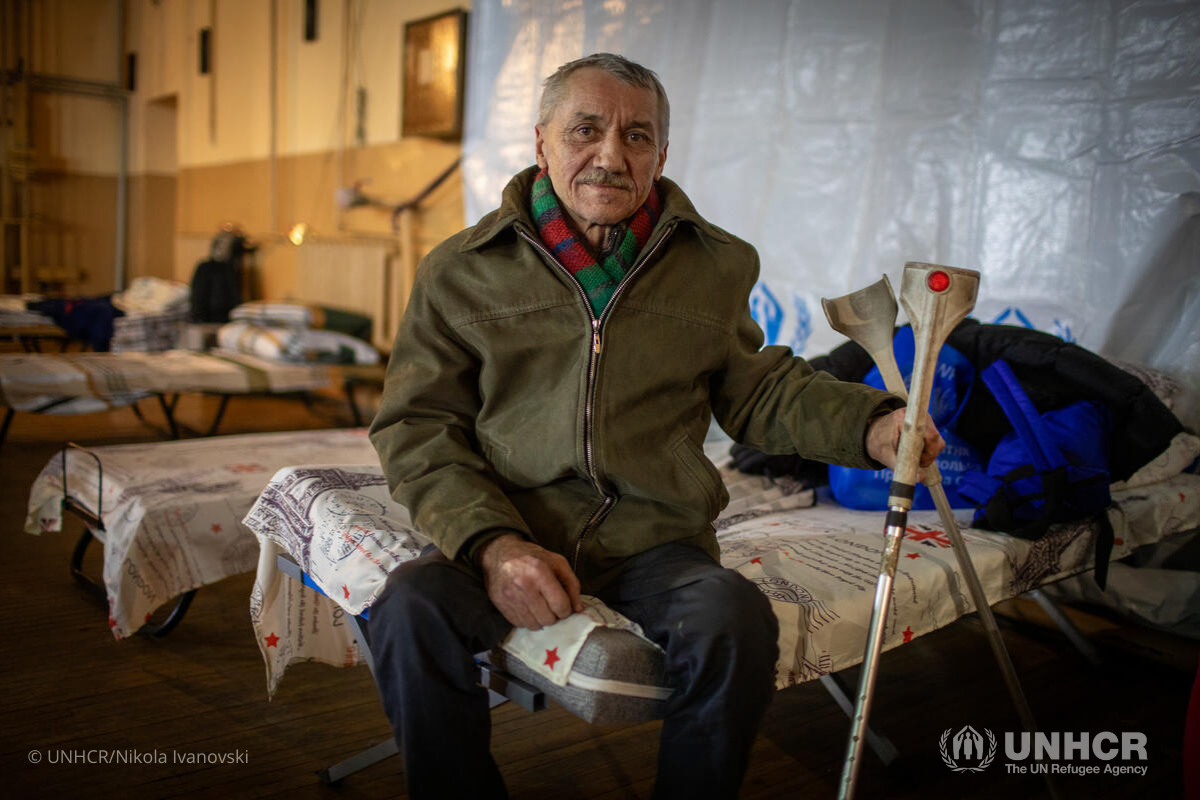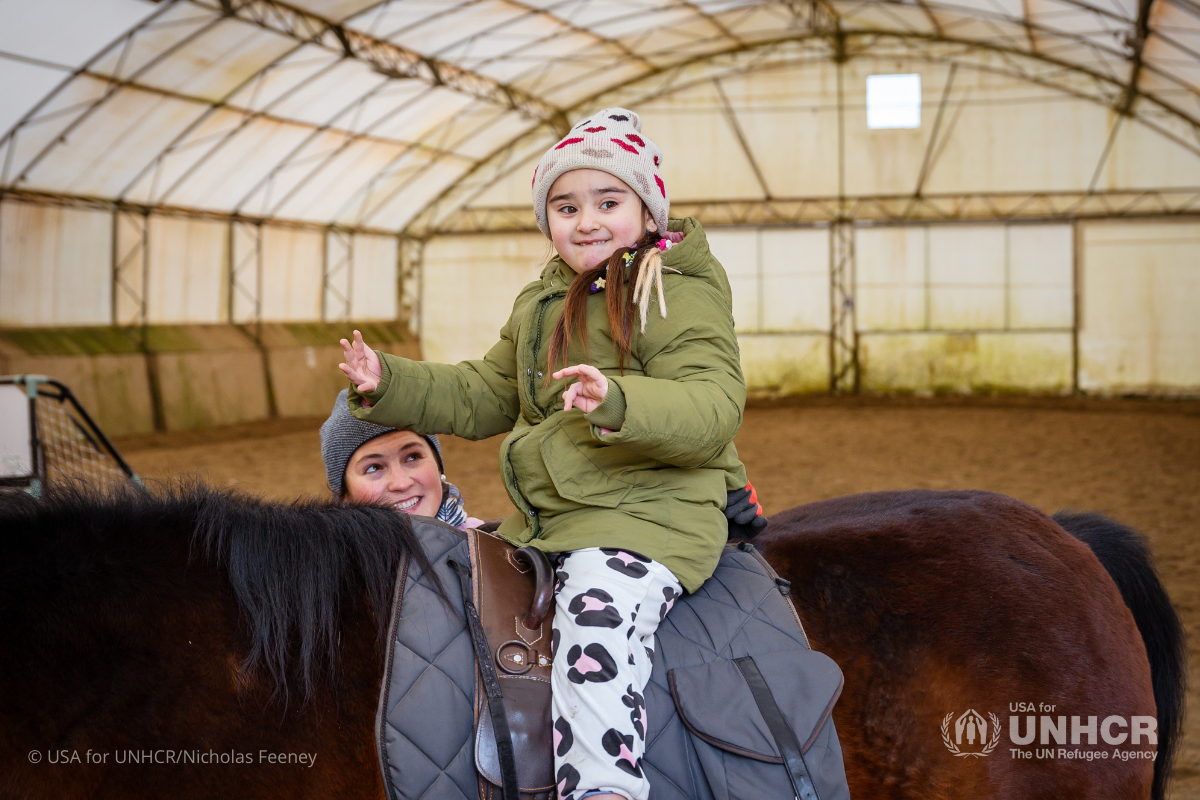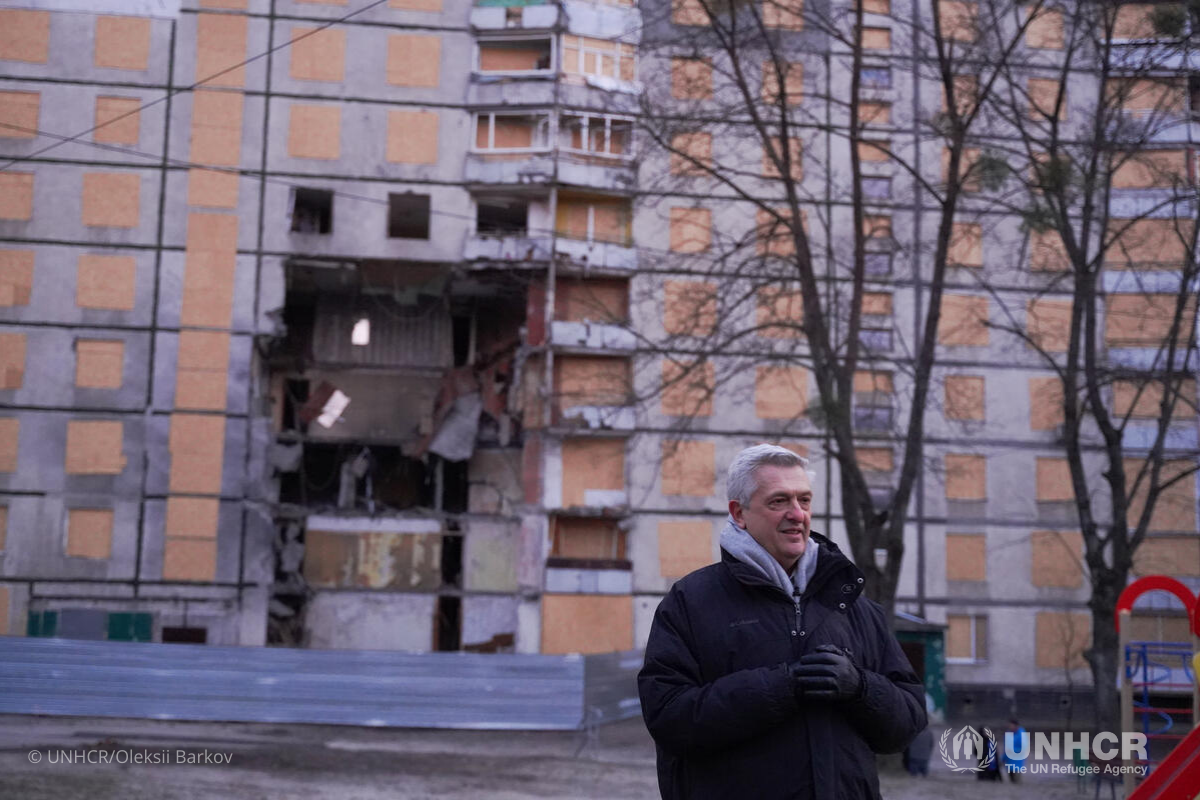Public service drives this American’s work to protect refugees
Born and raised in Colorado, Kevin J. Allen has worked for UNHCR, the UN Refugee Agency, since 2004. He currently serves as the UNHCR country representative in Poland, leading protection efforts for Ukrainian refugees. Before Poland, Kevin worked in Bangladesh, leading rescue efforts for Rohingya refugees. His career in service also includes time in the Peace Corps and, before that, as a U.S. Marine.
Can you share about your background and your path to UNHCR?
I grew up in Colorado on a wheat farm where very few people have ever heard of UNHCR. What ultimately drove me to UNHCR was a desire to engage in public service. That path initially led me to the Marine Corps, then to the Peace Corps, and ultimately to international humanitarian work.
I wasn't sure my military background would be welcome or even something I should talk about when I first joined UNHCR. But when I worked in high-risk duty stations like Afghanistan, for example, with a big operational component, I found that a lot of the things I learned in the military, like teamwork, coordination, operations, and management, were in some ways similar to work I was undertaking at UNHCR. It was a different objective, and at the same time, I think the military experience gave me insights and intuitions into working where it can be dangerous. So, strangely, it's been an asset for me. It's not a typical path to go from the Marine Corps to the Peace Corps to UNHCR, but that was my path.

What is your role with UNHCR in Poland?
I manage UNHCR’s overall operation in Poland and arrived shortly after the full-scale Russian invasion of Ukraine back in 2022. The operation here is somewhat unique in that we're situated within the European Union, in Poland, which did an exceptional job of receiving millions and millions of refugees across the border.
Our job is to make sure that people get the protection and the legal status that they merit after fleeing persecution and war and then to help the most vulnerable, the refugees in the shadows who may fall through the cracks. The most important thing we can do at this juncture is to invest in the human capital of Ukrainian refugees for the future, hoping that there will be peace one day.
What are some of the most pressing issues facing Ukrainian refugees?
We’re closely watching what's happening at the border and in Ukraine because the situation remains very volatile. I was on a mission in November 2024 in Ukraine and witnessed firsthand the dramatic escalation of drone attacks, and what are called glide bombs, that the Russian Federation is using with devastating effect in civilian areas. At the same time, the energy power infrastructure is being bombarded and is currently at less than half of its capacity.

There is a real risk for more movements into Poland and, if not into Poland, internally within Ukraine. There are about 4 million people displaced internally in Ukraine and more than 6 million refugees who've had to cross borders. That’s more than 10 million Ukrainians pushed out of their homes, whether at gunpoint or because of missile strikes or other aspects of war. It’s essentially the same size as the population of Greece, an entire major European country forced to flee.
What has changed since 2022 in terms of the refugee response in Poland?
Today, the response in Poland is more about helping Ukrainians attain a degree of self-sufficiency and find jobs and in the case of children, making sure that they all take advantage of the ability to go to school. Poland has generously opened up education to all, but a number of families and children still aren't sure they want to enroll in school here. They may be keeping one foot back in Ukraine, hoping they can return. Ultimately, one of the most challenging things for Ukrainians is that they see no end. It's been three years now since the full-scale invasion of Ukraine. And this starts to weigh on people.
We continue to receive people in Poland seeking asylum, largely from the east of Ukraine, from the most conflict-ridden areas of the country. And so we continue to have as many as 20,000 new arrivals in Poland in any given month. These people often are fleeing very serious conflict situations. Mental health and psychosocial support needs are tremendous. A number of the refugees who arrive here have disabilities, so making sure that they are referred to the correct type of support is critical.
What’s an aspect of this crisis that is underreported?
Many women who arrived in Poland with little more than a suitcase of clothes and their young children were educated, some in professional fields such as accounting, law or healthcare, but arrived not speaking Polish and not having the certifications needed to work in those fields here in Poland. It did not stop them from still looking for a job, cleaning rooms in a hotel, for example. Taking care of children in a nursery. Although not using their skills to maximum effect, they show a level of resilience and strength, which incredibly contributed to 1 percent of Poland's gross domestic product (GDP) in 2023.
And while the vast majority of Ukrainian refugees are women and children, you may ask, "Where is Dad? Where is the husband?" The reality is, most times, they're fighting in Ukraine. So you have a population of refugees here in Poland, which is about a million people, defined by family separation. That in and of itself creates a lot of anxiety and a lot of needs.
It’s a story of tragedy, frankly, of a gross violation of the most basic norms of international law, with a sovereign country being invaded. But the other side of that coin is a story of the strength and resilience of the human spirit. And you see it most prominently in the media, with the men and women in Ukraine who are fighting. But I see it in my job, in the refugees who've arrived here and continue to make ends meet and continue to persevere.
How does UNHCR responsibly steward funds in a complex operation like Poland?
From my vantage point, both as a UNHCR official and frankly as a U.S. citizen and taxpayer, it's my job to ensure that we maximize every taxpayer dollar to maximum effect. Many people might not know, but the U.S. government, through the generosity of the American people, has long been a strong partner of UNHCR. This support continues to be vital for our us to deliver lifesaving protection to refugees around the world who have been forced to flee war and persecution. I help to ensure funding is used efficiently in Poland by coordinating with all actors working in the refugee response space. If you look at the operation here in Poland, there are more than 100 different UN and non-governmental organizations. We work very closely with all of them to ensure we're not duplicating efforts.
We have people working in education and health, on accommodation and livelihood issues. And we work closely with the government to make sure that we're not overlapping or duplicating what the cities are doing, what the municipalities are doing, or what the central government is doing. In some ways, my job, and perhaps this is the more bureaucratic aspect of it, is to ensure that what we're doing is efficient and that we're having maximum impact.
How do you stay motivated?
When I feel tired or fatigued, I try to get out of the office and engage with the people that we've been asked to support and protect. That gives me motivation because I see the challenges that they've faced. It makes it impossible for me to forget about that situation and it reminds me of the moral relevance of what we're doing. This is a very unique job that we have, where we are literally saving lives and working to rebuild lives that have been shattered.
Why should Americans continue to support Ukrainians?
When we talk about over 6 million Ukrainians who fled Ukraine, they did not flee because of internal conflict or persecution. They fled because a foreign power invaded their country. It’s more important than ever for people to remain engaged and not to forget Ukraine or the Ukrainian people. So much is at stake. It's important that UNHCR stands with the people of Ukraine, that we stand with those who were forced to flee and do whatever we can to help build their resilience and support the strength that they have so that hopefully they can go back one day and rebuild Ukraine.
One thing that I always advocate is for people to hear directly from people with the lived experience of being displaced. What does an actual human being who is forced to flee their home in the middle of the night at gunpoint face and feel? That's relevant, that's real, that's morally significant. And I think it's important that we sometimes cut through the facts and the figures and the bureaucracy and the politics and really keep our eye on what is the heart of the matter here, and that is individual human beings who are forced to flee.
How can you help...
UNHCR, the UN Refugee Agency, supports refugees who have been forced to flee violence, war and persecution. Our donors help refugees in their greatest time of need with shelter, food, water and medical care, and their support builds awareness for resettled refugees living in the U.S. With your help, more refugees will have the opportunity to build peaceful lives and give their families a bright future.


